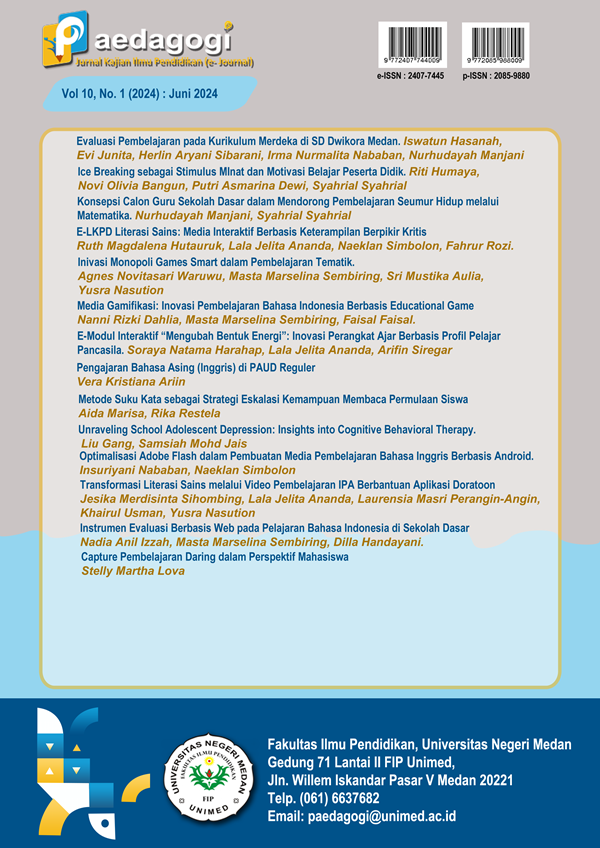Unraveling School Adolescent Depression: Insights into Cognitive Behavioral Therapy
DOI:
https://doi.org/10.24114/paedagogi.v10i1.58001Keywords:
Adolescent Depression, Cognitive Behavioral Therapy (CBT), Efficacy, Mechanisms of Change, Intervention ChallengesAbstract
Adolescent depression presents a significant global mental health concern, exerting profound impacts on various facets of young people's lives. Cognitive Behavioral Therapy (CBT) has emerged as a leading intervention for tackling adolescent depression, grounded in principles derived from cognitive theory. This review delves into the effectiveness, mechanisms, and outcomes of CBT in addressing adolescent depression, synthesizing findings from a range of empirical studies including randomized controlled trials, meta-analyses, and systematic reviews. The review underscores the consistent efficacy of CBT in diminishing depressive symptoms among adolescents, elucidating mechanisms such as cognitive restructuring and behavioral activation that underpin its therapeutic effects. Additionally, CBT yields favorable outcomes beyond mere symptom reduction, encompassing enhancements in social connections and academic performance. Nonetheless, challenges such as limited accessibility and hurdles in engaging adolescents persist in CBT implementation. To surmount these obstacles, forthcoming research ought to concentrate on devising innovative delivery approaches, such as internet-based interventions and school-centered programs. In essence, CBT stands as a pivotal component in the treatment of adolescent depression, furnishing a holistic framework to address the intricate interplay of cognitive, emotional, and behavioral elements, thereby fostering the mental well-being of adolescents on a global scale.References
Beck, J. S. (2011). Cognitive behavior therapy: Basics and beyond (2nd ed.). Guilford Press. https://www.psychiatrist.com/wp-content/uploads/2021/02/11841_cognitive-behavior-therapy-basics-beyond-nd-ed.pdf
Butler, A. C., Chapman, J. E., Forman, E. M., & Beck, A. T. (2006). The empirical status of cognitive-behavioral therapy: A review of meta-analyses. Clinical Psychology Review, 26(1), 17“31. doi: https://doi.org/10.1016/j.cpr.2005.07.003
Cox, G. R., et al. (2020). Cognitive-behavioural therapy for adolescent depression: A systematic review and meta-analysis. Child and Adolescent Mental Health, 25(1), 11“26.
DeRubeis, R. J., Siegle, G. J., & Hollon, S. D. (2008). Cognitive therapy versus medication for depression: Treatment outcomes and neural mechanisms. Nature Reviews Neuroscience, 9(10), 788“796. https://www.nature.com/articles/nrn2345
Hofmann, S. G., Asnaani, A., Vonk, I. J., Sawyer, A. T., & Fang, A. (2012). The efficacy of cognitive behavioral therapy: A review of meta-analyses. Cognitive Therapy and Research, 36(5), 427“440. https://link.springer.com/article/10.1007/s10608-012-9476-1
Kazdin, A. E. (2007). Mediators and mechanisms of change in psychotherapy research. Annual Review of Clinical Psychology, 3, 1“27. https://link.springer.com/journal/10608
Leahy, R. L., Holland, S. J., & McGinn, L. K. (2012). Treatment plans and interventions for depression and anxiety disorders (2nd ed.). The Guilford Press. https://books.google.co.id/books?hl=id&lr=&id=xZy2xJB9YsC&oi=fnd&pg=PP1&dq=Leahy,+R.+L.,+Holland,+S.+J.,+%26+McGinn,+L.+K.+(2012).+Treatment+plans+and+interventions+for+depression+and+anxiety+disorders+(2nd+ed.).+The+Guilford+Press.&ots=ZALI4C2CFT&sig=i5AzHMQo20X5e6wWZ1-BF9_Qawg&redir_esc=y#v=onepage&q&f=false
Merry, S. N., Hetrick, S. E., Cox, G. R., BrudevoldIversen, T., Bir, J. J., & McDowell, H. (2012). Psychological and educational interventions for preventing depression in children and adolescents. Cochrane Database of Systematic Reviews, (11). doi: https://doi.org/10.1002/ebch.1867
Stice, E., Rohde, P., Gau, J. M., & Wade, E. (2021). Efficacy trial of a brief cognitive-behavioral depression prevention program for high-risk adolescents: Effects at 1- and 2-year follow-up. Journal of Consulting and Clinical Psychology, 89(1), 62“74. doi: https://doi.org/10.1037/a0020544
Weisz, J. R., et al. (2017). Cognitive Behavioral Therapy for Adolescent Depression: A Meta-Analytic Investigation of Changes in Effect Size Estimates. Journal of the American Academy of Child & Adolescent Psychiatry, 56(12), 1088“1098.
Wright, B., Tindall, L., Littlewood, E., Allgar, V., Abeles, P., & Trépel, D. (2019). Computerised cognitive-behavioural therapy for depression in adolescents: Feasibility results and 4-month outcomes of a UK randomised controlled trial. BMJ Open, 9(5), e023584. doi : https://doi.org/10.1136/bmjopen-2016-012834
Downloads
Published
Issue
Section
License
Copyright (c) 2024 Liu Gang, Samsiah Mohd Jais

This work is licensed under a Creative Commons Attribution-ShareAlike 4.0 International License.
Authors published with the Paedagogi: Jurnal Kajian Ilmu Pendidikan (e-journal) agree to the following terms:
- Authors retain copyright and grant the journal the right of first publication with the work simultaneously licensed under a Creative Commons Attribution License (CC BY-SA 4.0) that allows others to share the work with an acknowledgment of the work's authorship and initial publication in this journal.
- Authors are able to enter into separate, additional contractual arrangements for the non-exclusive distribution of the journal's published version of the work (e.g., post it to an institutional repository or publish it in a book), with an acknowledgment of its initial publication in this journal.
- Authors are permitted and encouraged to post their work online (e.g., in institutional repositories or on their website) prior to and during the submission process, as it can lead to productive exchanges, as well as earlier and greater citation of published work. (See The Effect of Open Access)


